- Home
- Gerald Hammond
Adverse Report Page 2
Adverse Report Read online
Page 2
I had no time for detailed examination. A least the place seemed dry. I emptied my panniers by dumping my clothes onto my uncle’s bed, rode back into Newton Lauder and went shopping in a small supermarket where they seemed to find my accent as funny as I found theirs.
The solicitor had said something about having the meters read. I had expected this to take the three weeks which it would have taken at home, but either he had some clout or the Scots react with special promptitude to the idea of somebody getting electricity on somebody else’s account, because the meter reader was at the door when I got back. He was a garrulous little chap with more than his share of what I was coming to recognise as the local accent, but at least he turned the electricity on for me and saw that everything was working. He said that my uncle had been well liked in the neighbourhood despite the rarity of his visits. When I mentioned the – umm – guests to which the solicitor had referred, he changed the subject.
When he was gone, no doubt to spread a great deal of inaccurate gossip about me, I got down to clearing a living space for myself and airing fresh sheets. As I headed for my uncle’s bed that night, earlier than would have been my habit in London, lights were springing up at unexpected points as hidden cottages revealed their presence.
I wondered idly whether I could ever settle down in such a place. I decided that I would hate to live so close to a busy road and then, just before I dropped into a deep sleep, laughed at myself because, apart from my motorbike and the meter reader’s van, the total of traffic past the house since my arrival had been one tractor, one car and a young girl on a pony. The car had slowed until I thought that the driver intended to pay a visit, but when I switched on a light the car had spurted angrily away.
Chapter Two
The telephone at least had not been disconnected. Mr Enterkin, apparently, had not feared that the mice would offset the loneliness of the empty house by calling their relatives in far-off lands. A morning call had me up and ready by the time a car’s horn sounded outside.
The solicitor seemed to look at me with less disapproval than he had shown the day before. I still saw nothing wrong with my own wardrobe; but among my uncle’s suits I had found one, in pale grey flannel, which fitted me well and was cut in a style which was returning to fashion. With it, I wore a shirt of my own and one of my uncle’s ties.
‘I did not know,’ Enterkin said in greeting, ‘that you were a member of the Scottish Nationalist Party.’
‘The tie?’
‘Yes. But never mind. You are in some good company, some less so. This is Keith Calder.’
Calder shook hands from his position at the wheel of an old but well-preserved Rover. He was into his forties and almost out of them again, but his Mediterranean style of good looks (perhaps a legacy from one of the many Spanish sailors wrecked on the Scottish coast after the Armada) were wearing well and his black hair showed no more than a distinguished trace of grey at the temples to attest that the colour was original. His manner was gloomy, showing no sign of the mischievous humour with which I was to be poked and prodded later. Enterkin took the other front seat and I was relegated to the rear.
The car, I gathered, was Enterkin’s ewe lamb and he seemed irritated that Calder had insisted on driving, but Calder remained firm. ‘If you drive, Ralph, we might get there by the right time, but tomorrow. I’ll get us there with time in hand for a coffee.’
Enterkin sighed deeply. ‘Try to leave some tread on my tyres,’ he said, ‘and remember that the man in the driver’s seat pays for the petrol.’
‘Sue me,’ Calder said. I hoped that it was the comfortable bickering, quite without trace of malice, which can become habitual between two old friends. Over Calder’s shoulder I saw that the tank was half-full. He was a good driver but the solicitor caught his breath whenever a bend or another vehicle was in sight.
We slipped through Newton Lauder and headed north. To my eyes, accustomed to the ribbon developments of the South or the confining unreality of motorways, the sight of such endless tracts of open countryside was almost agoraphobic. After an hour or so we were skirting a city which I identified from the signposts as Edinburgh.
By way of making polite conversation, the solicitor asked some question about my writing activities. Calder, who seemed to have other things on his mind and to regard my presence as an irrelevancy, pricked up his ears. ‘Are you Simon Parbitter, the mystery writer?’ he asked.
‘Among other work,’ I admitted. My crime-writing, fact and fiction, together with the ghosted autobiographies, accounted for most of my income; but I would rather be remembered for my carefully researched political histories or my two historical novels.
‘I don’t have much time to read fiction,’ he said. (I wondered how many before him had used those words to me.) ‘My wife and daughter read it by the hour. They’ve shown me pieces from your books.’
‘Oh?’ I said. I prepared to sound modestly flattered, but he fell silent and concentrated on his driving and whatever was worrying him.
Signposts indicated Glasgow, but instead of the Glasgow motorway we took one posted for Stirling. Scotland seemed to go on for ever. (I realised later that we had still penetrated only a third of its length.) We came off the motorway for Linlithgow, which turned out to be an even older town than Newton Lauder and somewhat larger. As promised, we had time to visit a neat café for coffee over which Enterkin rambled on about Linlithgow’s long history.
I was becoming absorbed in his discourse when Calder suddenly came out of his trance and scowled at me. ‘Luger revolvers!’ he said.
‘I beg your pardon?’
‘The Spinet Legacy. You had somebody rushing around brandishing a Luger revolver.’
I felt my ears go hot. ‘Is there something wrong with that?’
‘Aye. The Luger, or Parabellum, was a design of semi-automatic or self-loading pistol which you’d probably call an automatic. In fact, it was an improvement on the original Borchardt. There never was a Luger revolver yet. And you had another character checking the magazine of his revolver!’
Enterkin chuckled. ‘Perhaps I should have warned you that Keith’s a gunsmith with a special interest in history.’
‘I hardly think,’ I said stiffly, ‘that the average reader would know the difference.’
‘The less your reader knows, the greater your obligation to instruct him. In Scare, you made it clear that the baddy was carrying a double-barrel hammerless shotgun. And then you wrote, “I heard the click as he cocked the actuating mechanism”. What in hell was that supposed to mean?’
‘Exactly what it said.’
‘It didn’t mean a damn thing,’ he grunted. He got up to visit the toilet.
‘Is he always as rude as that?’ I asked.
‘Just sometimes,’ Enterkin said. He seemed to be highly amused at my expense. ‘Don’t take him amiss. He’s trying to be helpful, in his way. Ask his advice tomorrow and he’ll go to endless trouble to help you. Just now, he’s worried about this case. You’ll hear what it’s about later. I don’t understand the half of it myself, but the depute fiscal’s had her knife into Keith ever since he gave evidence here last year. He turned the prosecution’s case on its ear and the lady ended up with egg all over her unlovely face. She’s not the kind of person to take kindly to such treatment and this may be her chance to get even.’
I felt more cheerful as we walked to the Sheriff Court building. It seemed that my harshest critic faced harassment in his turn.
Calder was diverted into a witness room but Enterkin and I took seats in the small courtroom. Among the scattering of onlookers I identified a couple of bored reporters by their notebooks. Just behind them was sitting a stocky man of about my own age, with hair like a coir doormat and a weather beaten face, whose cast of features was vaguely familiar. I decided that he probably resembled some actor and forgot him for the moment.
The sheriff was disposing of the previous case – rather severely, I thought, although it was difficult to judge without knowing all the facts. (‘Sheriff Dougall,’ Enterkin whispered. ‘Intransigent old beggar!’) The sheriff’s voice was noticeably patrician and yet undoubtedly Scottish, which gave me an uneasy feeling because I had supposed, in my innocence, that the upper strata of the Law were above provincialism.
Apart from the lack of a jury and the addressing of the sheriff as My Lord, the case, when it came on, could have been taken for an English inquest.
The depute procurator fiscal, a stout lady nearing middle age and blessed with the most ferocious jaw-line I had ever seen, introduced the broad facts in terms so short as to be worthless and then called her first witness. This was a police officer who had been called to Knoweheid Farm near Howeburn. (‘Hilltop Farm,’ Enterkin whispered in explanation.) There, among the whins (‘Gorse’) he had been shown the body of a man. This was later identified as the body of George Hatton. The head and hands were badly damaged and the remains of a shotgun were nearby.
After formal evidence of identification had been given and accepted, a pathologist testified that death had been instantaneous and had resulted from ‘damage to the head apparently caused by an explosion and the consequent intrusion of metal fragments, portions of some firearm’. The deceased had been in good health and there were no traces of drugs or alcohol. The right collarbone had been fractured and the hands badly damaged by the same explosion. All the injuries were consistent with having been caused by a bursting shotgun.
The proceedings, which until then had been about as lively as a reading from the ’phone-book, came to life when Hector Duffus was called. Mr Duffus, who was a farmer and the occupier of Knoweheid Farm, was a gnarled old man in his seventies but for all his years he radiated health and vitality. His accent was strong and his speech was threaded wit
h Scots words and phrases of which, to my relief, the sheriff himself frequently asked the meaning. Apart from mentioning that he caused a ripple of amusement with the phrase ‘a fiddler’s bidding’, which turned out to mean a last-minute invitation, I will make no attempt to reproduce the rich texture of his dialect.
According to Mr Duffus, the four who had made up the shooting party had shot together for many seasons, exchanging invitations every winter and occasionally meeting for a rabbit-shoot during the summer whenever the rabbit population merited an assault. This occasion had been suggested by an explosion of rabbits on Knoweheid Farm and he had taken advantage of the quiet spell which often precedes the harvest to invite his three nearer friends for a day combining sport and control. Because of the distance involved and the mundane nature of the event he had not mentioned it to George Hatton until one of the original invitees had been forced to drop out, but my uncle had accepted the ‘fiddler’s bidding’ with enthusiasm.
At this point, the depute fiscal had to discourage Duffus from expounding at length on the damage which the rabbits had been causing to his crops.
At first, Duffus continued, all had gone to plan. The dogs had hunted well and there had been a substantial cull. After an hour or so they had come to a knoll. My uncle had gone to stand guard over a small gulley which formed a favourite escape-route to holes near the top of the knoll, while the others put dogs through the gorse which ringed the base. A few shots had been fired. Suddenly, they had heard a loud report (‘a wappin’ fuff’). After a short hesitation, because shots can seem to vary greatly in loudness according to the angle at which they are fired relative to the hearer, he had walked up the gulley and found his friend lying exactly as the police had seen him. He had sent for the police and an ambulance immediately and the day’s sport had been abandoned.
The next witness, one Duncan Cameron of Shotsports (Edinburgh) Ltd, took up a disproportionate amount of the court’s time extolling his own experience and expertise as a specialist in firearms, with special reference to the number of reports written and the weight of evidence given. Even to my inexperienced ear the qualifications sounded thin, but he gave his evidence with the self-important pomposity which often impresses the gullible. His accent I thought precious.
He had examined the pieces of firearm which were before the court, he said. They were the remains of a double-barrel, twelve-bore, semi-hammerless shotgun, built to the design and patent of David Bentley by Roper of Sheffield. It had been a gun of quality in its day but it had burst in use with quite exceptional violence.
The depute procurator fiscal asked him whether he could offer any reason for the burst.
Mr Cameron smirked. ‘I can indeed,’ he said. ‘I examined with some care the remains of the barrels and of the cartridges which had been in the chambers. One cartridge had been almost totally destroyed, but I could discern that the other had been loaded with a modern propellant powder, one of the proprietary mixtures now available and based on nitrocellulose. However, the proofmarks on the flats of the breeches could still be made out and it was clear that the gun had been proved for black powder only.’
The sheriff leaned forward, God condescending to speak to a mortal. ‘In this context, what is meant by “proof”?’ I had the impression that he knew the answer and that his question was only for the record.
Cameron was evidently delighted by the invitation to further pontification. ‘In Britain,’ he said, ‘there is a legal requirement that no firearm may be sold unless it has been proved at either the London or Birmingham Proof House or at an overseas establishment of equivalent status. The procedures include the firing through each barrel of a cartridge generating pressures substantially greater than those to be expected in normal use.’
‘And black powder?’
Cameron smiled and nodded. His tone and manner suggested that only he and the sheriff were capable of appreciating the finer points of his evidence. ‘At the time the gun was built, my lord, black powder, also known as gunpowder, was the normal propellant. That powder generates lower pressures than the modern nitro or smokeless powders. I can therefore state that the deceased was using cartridges which produced pressures as great as or greater than that of the proof cartridges with which the gun had been tested nearly a hundred years ago.’
‘I see,’ said the sheriff. He began writing, as if, for him, the matter was over.
The depute procurator fiscal looked down at her papers. ‘Of what were the gun-barrels constructed?’ she asked. It struck me as an odd question.
‘They were of the so-called “Damascus” construction; that is to say, they were made from a fine weave of iron and steel, wound around a mandrel and hammer-welded. That construction was erroneously believed to produce very strong barrels. It fell into disuse as soon as the techniques of modern steelmaking were developed.’
‘Would these factors be sufficient to explain the tragedy?’
Cameron smiled loftily. ‘These matters are hardly susceptible to mathematical calculation,’ he said. ‘Any further evidence has literally gone up in smoke.’ He paused for effect and there was a faint whisper of amusement. ‘But it must be said that if a barrel which had presumably been discharging similar cartridges for some years chose that occasion to burst with such extreme violence, it suggests that the cartridge may have been faulty. Loading errors can sometimes produce pressures many times the norm.’
As Cameron bowed and left the courtroom, I found myself agreeing with the sheriff. Why we had brought Calder along seemed to be the only mystery remaining.
Calder was the next and final witness. As he entered, he saw the shattered gun which lay on the central table and checked in his stride for a moment. While he took the oath, his eyes were still fixed in that direction. His examination is worth recording in full.
‘Tell the court your name.’
‘Keith Calder.’
‘And your occupation?’
‘Gunsmith . . .’
‘Thank you . . .’
‘. . . gun dealer and . . .’
‘Thank you very much.’ The depute fiscal’s voice drowned him out. ‘Please tell the court your place of business.’
‘I am the proprietor of the gunshop in Newton Lauder. And I may say that I . . .’
It was the sheriff’s turn to interrupt. ‘Is it your intention to qualify Mr Calder as an expert witness?’ he asked.
‘No, my lord, it is not.’
Calder remained calm, but I could see that it cost him an effort. ‘My lord,’ he said, ‘I was only attempting to answer the question.’
‘Please confine yourself to doing that and no more.’ The sheriff nodded to the depute fiscal.
‘You were acquainted with the late Mr Hatton?’
‘I was. Principally as my customer, but I had met him socially.’
She picked up a – to me – unrecognisable lump of metal. ‘This has been identified as a part of the gun which burst, killing him. It bears a number. Can you confirm that it was in fact his gun?’
Calder studied the part for a few seconds and I could see that his mind was in overdrive. ‘It was,’ he said. ‘One of a pair.’
‘Did you ever carry out any work on this gun?’
‘I did.’
‘Please tell the court what it was.’
‘I don’t know which gun of the pair that is,’ Calder said. ‘If . . .’
‘Then how do you know that you carried out work on it?’ the depute fiscal snapped.
‘Because I did work on both of them.’
His lordship was frowning. ‘Is all this really relevant?’
‘As it transpires, m’lud, no. I only wished to show that the gun had been through Mr Calder’s hands. Mr Calder, what was the proof status of the guns?’
‘Each gun had been proved for black powder and was still within the requirements for that proof.’
‘You knew that the guns were only proved for gunpowder? Yet you returned them to him for use with smokeless cartridges?’

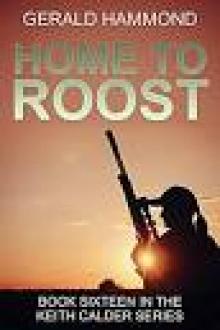 Home to Roost
Home to Roost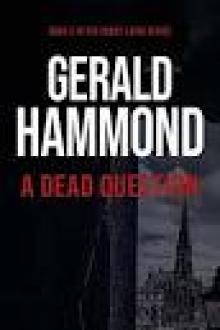 A Dead Question
A Dead Question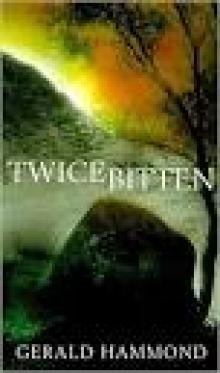 Twice Bitten
Twice Bitten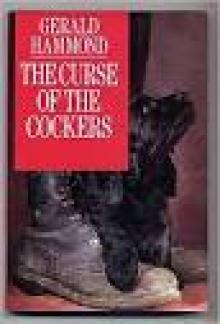 The Curse of the Cockers
The Curse of the Cockers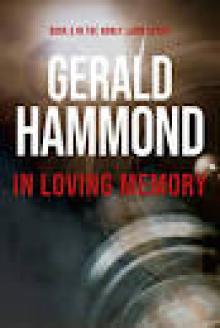 In Loving Memory
In Loving Memory Illegal Tender (Three Oaks Book 12)
Illegal Tender (Three Oaks Book 12)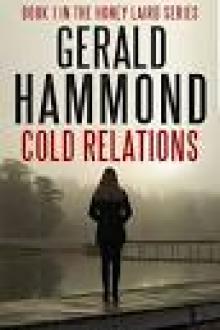 Cold Relations (Honey Laird Book 1)
Cold Relations (Honey Laird Book 1)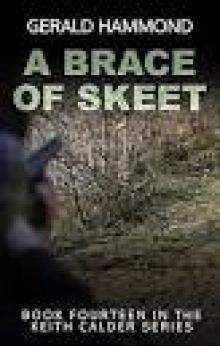 A Brace of Skeet
A Brace of Skeet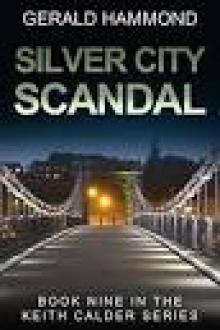 Silver City Scandal
Silver City Scandal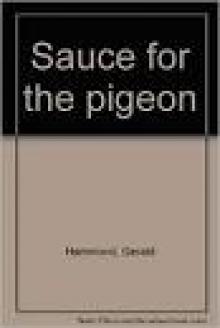 Sauce For the Pigeon
Sauce For the Pigeon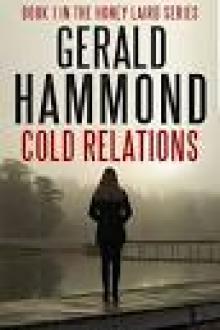 Cold Relations
Cold Relations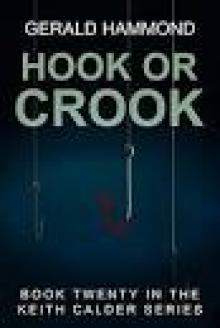 Hook or Crook
Hook or Crook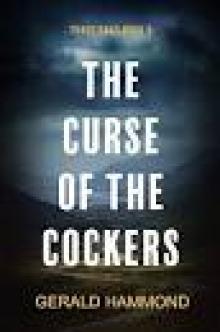 The Curse of the Cockers (Three Oaks Book 5)
The Curse of the Cockers (Three Oaks Book 5)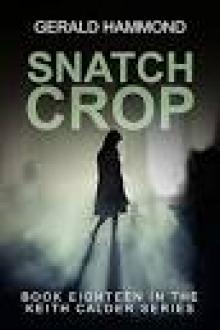 Snatch Crop
Snatch Crop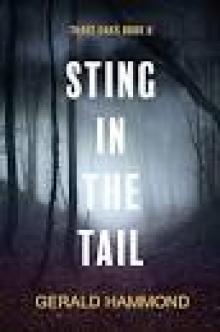 Sting in the Tail (Three Oaks Book 6)
Sting in the Tail (Three Oaks Book 6)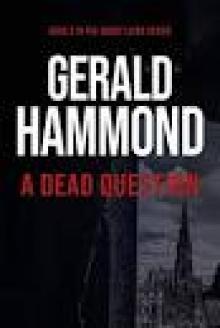 A Dead Question (Honey Laird Book 2)
A Dead Question (Honey Laird Book 2)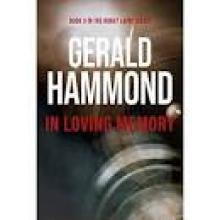 In Loving Memory (Honey Laird Book 3)
In Loving Memory (Honey Laird Book 3) Thin Air
Thin Air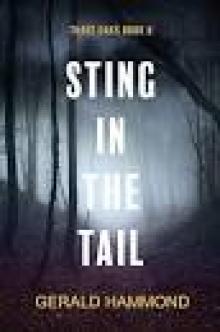 Sting in the Tail
Sting in the Tail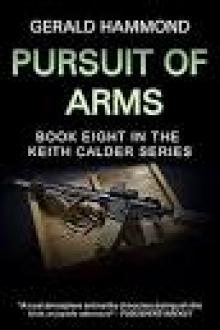 Pursuit of Arms
Pursuit of Arms The Game
The Game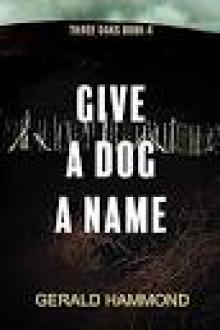 Give a Dog a Name (Three Oaks Book 4)
Give a Dog a Name (Three Oaks Book 4) Fair Game
Fair Game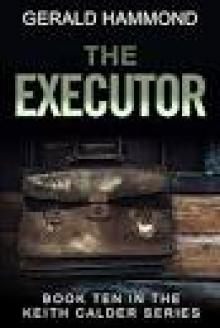 The Executor (Keith Calder Book 10)
The Executor (Keith Calder Book 10) Whose Dog Are You? (Three Oaks Book 2)
Whose Dog Are You? (Three Oaks Book 2)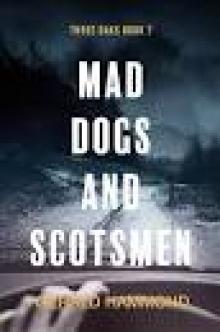 Mad Dogs and Scotsmen (Three Oaks Book 7)
Mad Dogs and Scotsmen (Three Oaks Book 7)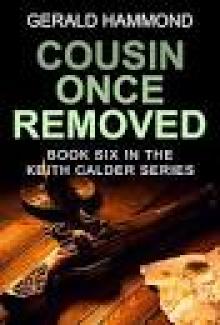 Cousin Once Removed
Cousin Once Removed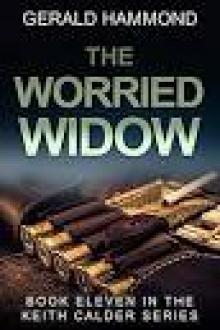 The Worried Widow
The Worried Widow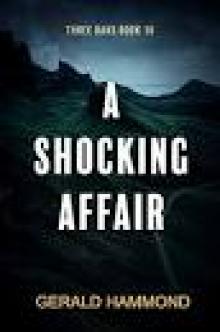 A Shocking Affair
A Shocking Affair Dead Weight (Three Oaks Book 11)
Dead Weight (Three Oaks Book 11) Whose Dog Are You
Whose Dog Are You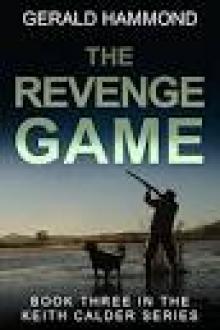 The Revenge Game
The Revenge Game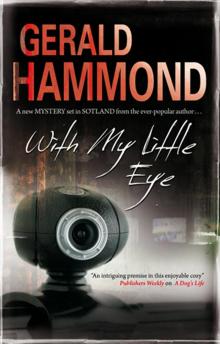 With My Little Eye
With My Little Eye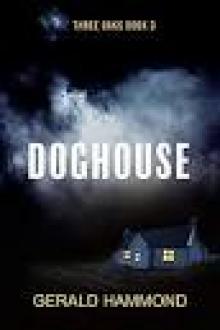 Doghouse (Three Oaks Book 3)
Doghouse (Three Oaks Book 3)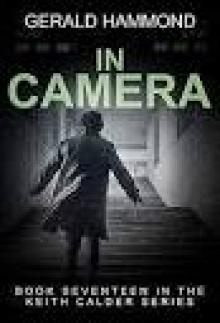 In Camera
In Camera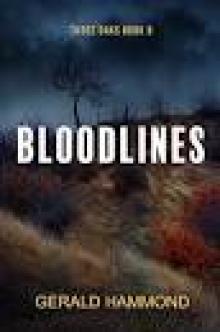 Bloodlines (Three Oaks Book 8)
Bloodlines (Three Oaks Book 8)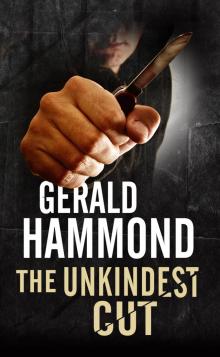 The Unkindest Cut
The Unkindest Cut